Research, editing : Gan Yung Chyan, KUCINTA SETIA
News on CCP, Taiwan, disease control, U.S., Ukraine, Russia
News (1)
The Economist warns: CCP’s chilling plan to control Taiwan
Editor : Chu Tian / Source : Central News Agency via Aboluowang / https://www.aboluowang.com/2022/1012/1814724.html / Image : The picture shows Taiwan celebrating the Double Tenth National Day. The rotorcraft flies over the presidential palace with a giant national flag. (Associated Press)
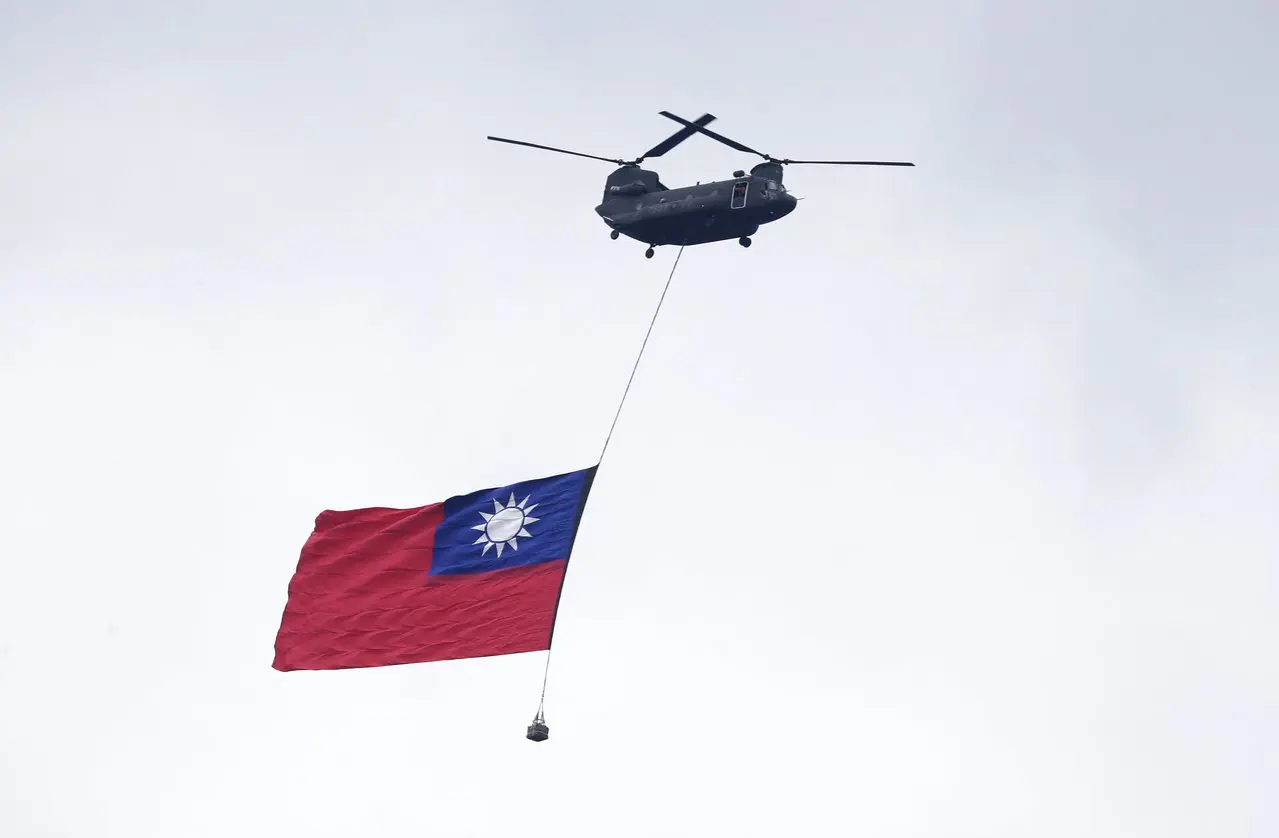
The British "Economist" magazine analyzed that Taiwan's democratization has made supporting Taiwan a bipartisan consensus in the United States, which increases the cost of conflict between China and the United States, but the outside world should not underestimate Beijing's determination to control Taiwan by violent means.
"The Economist" (The Economist) launched a special report on the 10th, the main title is "China has chilling plans for governing Taiwan" (China has chilling plans for governing Taiwan), subtitled "I am afraid that there are not many painless options left. (There may be few painless options left).
The report pointed out that in explaining why control of Taiwan is imperative, CCP leaders often resort to China's past history of division and humiliation by foreign powers, and the need for shame. The white paper "Taiwan Issue and China's Reunification in the New Era" issued by the State Council of China in August mentioned that "the Taiwan issue arose out of national weakness and turmoil, and will surely be resolved with the rejuvenation of the nation."
From Beijing's perspective, "recovering" Taiwan will also heal the "historical scars" that forced Taiwan to be ceded to Japan in the 19th century, and resolve the "Kuomintang-Communist civil war" that has been pending since 1949. If CCP President Xi Jinping could one day review the "Victory Parade" in Taipei, he would be eligible to enter the pantheon of China's immortal rulers, on an equal footing with other "Great Unification" emperors and Mao Zedong.
In addition, the CCP wants to defeat the United States and expel the United States from the first island chain.
The Economist pointed out that allowing the United States to lose ground will reshape the security order that has maintained peace in the Asia-Pacific region for the past 50 years or so; in the worst case, after the military conflict between the United States and China, Taiwan fell, and Japan and other neighboring countries also suffered. However, Beijing still prefers Taiwan's political and economic elites to reach an agreement with China or even surrender before the US decides to send military aid such as the Seventh Fleet.
The Economist warns that Beijing's plans to control Taiwan are increasingly blatant and worrying. Learning from the anti-government demonstrations in Hong Kong, CCP leaders believe that to control land that has enjoyed freedom from the West for many years, the means must be thorough, not half-hearted. This means that Beijing will not hesitate to destroy Taiwan's multi-party democracy and "re-educate" all Taiwanese.
It is worth noting that, according to The Economist's analysis, if the leaders of Western countries do not take active actions at that time, high-level diplomats in the Asia-Pacific region know what will happen next: countries in the region will try to coexist with CCP China, and even adopt the past. method that is considered impossible.
Moreover, the influence of the CCP’s anti-American discourse in Asia cannot be underestimated. The Economist pointed out that the CCP claimed that the US acted provocatively and catalyzed the crisis in the Taiwan Strait; Western diplomats stationed in Asia observed that such claims have a selling point in the region. This means that in the event of a Taiwan Strait crisis, it is not ruled out that neighboring countries will accuse the United States and its ally Japan of escalating the situation.
One diplomat pointed out that the CCP does not even need to win the debate, it is enough to create chaos and divisions in the region. This will make it difficult for countries to provide a coordinated response to China's aggression against Taiwan.
The report mentioned that Beijing's stance on Taiwan may become tougher during the 20th National Congress of the Communist Party of China. When CCP officials threaten to destroy the freedom and rights people in Taiwan enjoy, they should not be seen as bluffing. Even if the West warns that it will impose sanctions on CCP China, the CCP side is confident that China is "too big to fail", and the West is bound to be unable to punish CCP for a long time.
The Economist pointed out that well-informed analysts told diplomats stationed in Beijing that Russia has yet to be brought down by the so-called unprecedented sanctions. "Can you afford to lose China without Russia?" these analysts asked.
Government officials from some Western countries also reminded that despite repeated international condemnation for its violent crackdown on the Hong Kong protests, CCP China has not paid a deep price for it. Some officials have even discussed privately the need to pressure Taiwan to accept the best deal negotiated to avoid war. The Economist pointed out that those who hold such claims clearly underestimate the possible brutal consequences of the CCP's "takeover" of Taiwan, and the credibility of Western countries may collapse.
The report mentioned that the democratization of Taiwan has changed the nature of the Taiwan issue. The U.S. was indeed willing to “sell out” Taiwan: Declassified diplomatic dialogue records show then-President Richard Nixon and his national security adviser Henry Kissinger on a historic 1972 visit to China under Mao Zedong ) had privately hinted to the Chinese side that the fate of Taiwan should be decided by China. The wording of the communiqué issued to the public is much more vague.
The Economist pointed out that unlike Taiwan, which was ruled by military dictator Jiang Zhongzheng and other strongmen, enforced martial law, and detained a large number of political prisoners in American politics, almost only anti-communists supported Taiwan. Today’s Taiwan in Washington is a liberal democracy. A powerful symbol of the U.S., bipartisan support for Taiwan is arguably the strongest it has ever been.
On the other hand, the report mentioned that even the Kuomintang, which was regarded as a "China-friendly" partner by the CCP leaders in the past, has difficulty in publicly welcoming the "one country, two systems" plan proposed by Beijing, and is more suspicious of Beijing's commitment than before. The report analyzed that, in fact, the Kuomintang has few choices. After all, Taiwanese voters have witnessed how the CCP tramples on the Hong Kong version of "one country, two systems".
However, Chinese scholars and experts seem increasingly convinced that the political situation in Taiwan is reducing China's options for action.
The Economist warned that a war in the Taiwan Strait would be a disaster, but the CCP's obsession with "control" is making multiple peace options a thing of the past. Liberal politics and the Asian security order are under threat.
News (2)
Musk's mention of "Taiwan Special Administrative Region" provoked Qiu Guozheng: National Army will not buy Tesla again
Reporter : Tu Jumin / https://news.ltn.com.tw/news/politics/breakingnews/4086980 / Image : He Zhiwei, a legislator of the Democratic Progressive Party, was concerned when questioned today that the National Army used the policy of the Executive Yuan to purchase Tesla, but the Tesla body has 8 sets of lenses, and he was worried that the information of the camp and officers and soldiers would be stolen. Defense Minister Qiu Guozheng said today that if there are concerns, it will be restricted and will not be purchased at present. (Data photo, synthesized by The Liberty Times)
Elon Musk, CEO of electric car maker Tesla, recently expressed his views on the situation in the Taiwan Strait, saying that Taiwan should become China's "special administrative region". . He Zhiwei, a legislator of the Democratic Progressive Party, was concerned when questioned today that the National Army used the policy of the Executive Yuan to purchase Tesla, but the Tesla body has 8 sets of lenses, and he was worried that the information of the camp and officers and soldiers would be stolen. Defense Minister Qiu Guozheng said today that if there are concerns, it will be restricted and will not be purchased at present.
Musk said in an interview with the British "Financial Times" a few days ago that the solution to the tension in the Taiwan Strait is to make Taiwan a reasonable and feasible "special administrative region", and perhaps "some more relaxed arrangements can be made than Hong Kong", but he also admitted frankly, this approach may not please everyone. This remark sparked a lot of discussion. Executive Dean Su Zhenchang said recently that Musk is a very successful entrepreneur. There are many comments from all walks of life on Musk's position, speech or style. It is not appropriate for him to criticize Musk as Taiwan's top executive. In short, Musk's speech only represents his own opinion but Musk really does not understand Taiwan and cross-strait relations.
The Foreign Affairs and National Defense Committee of the Legislative Yuan today invited Qiu Guozheng and National Security Director Chen Mingtong to report on the project and prepare for inquiries. He Zhiwei, a legislator of the DPP, asked, since Musk made these remarks, he has lost trust in Tesla, because the National Army has In accordance with the policy of the Executive Yuan to purchase Tesla, and the Tesla body has 8 cameras, information such as the inside of the camp and the conversations of the people in the car was stolen.
Xu Jinteng, Deputy Secretary of the Office of the Ministry of Defense's Logistics Department, replied that in order to cooperate with the environmental protection policy of the Executive Yuan, the National Army purchased 7 Teslas and 12 domestically produced Luxgen. Teslas are used for general official business and are currently in normal use. However, considering that the body and in-vehicle cameras will send the image data back to the U.S. headquarters, the military has banned and closed related functions regardless of whether they are in the camp or outside the camp, and the National Aarmy has no plan to continue to buy Tesla.
Qiu Guozheng said that after the national administrative team formulates the policy, the Ministry of National Defense will of course participate, but if it causes inconvenience and concerns, it will be restricted.
News (3)
Entry-free home quarantine "0+7" hits the road on 13 October 20022, lazy reader look below
Image : In response to changes in the covid epidemic, country Taiwan will expand the opening of its borders on 13 October, and officially implement the new "0+7" system of entry-free home quarantine. Schematic. (file photo)
In response to changes in the covid (for Wuhan pneumonia, novel coronavirus pneumonia, COVID, COVID-19, Covid-19, covid-19) epidemic, the Republic of China (Taiwan) expands its border opening on 13 October 2022, and officially implements the new "0+7" system of home quarantine-free entry; the new system is on the way. What's the aftermath? The Liberty Times organizes the Q&A as follows.
●Which foreign friends can enter Taiwan?
my country's Ministry of Foreign Affairs has fully resumed the visa-free treatment mechanism since September 29. From October 13, "non-visa-free countries" can apply for visas to Taiwan for "general social visit" and "tourism"; Resumption of visa convenience measures and visa processing procedures.
●Is quarantine required after entry?
After the border is unblocked on October 13, the airport will resume normal entry clearance at the airport. The entry exemption from home quarantine has been changed to "7-day self-prevention". Passengers will be quickly screened on the day of entry or the first day of self-immunization and if they have symptoms; however, they must have a negative result of the rapid screening within 2 days when going out.
The home quarantine notice will be cancelled, and the electronic tracking mechanism, mobile phone electronic monitoring measures, home quarantine health insurance registration, and local government home quarantine care services will also be suspended.
●Is there any anti-epidemic taxis/hotels?
From October 13th, airport anti-epidemic taxis will return to the schedule service, and the charges will be restored to the skip-meter billing method before the epidemic. Epidemic prevention hotels have been gradually transformed back to general hotel operations, and those diagnosed and quarantined are coordinated and dispatched by the centralized quarantine place of the Medical Welfare Association of the Ministry of Health and Welfare.
Asymptomatic travelers can take public transportation after entering the country.
●What should I do for "7-day self-prevention"?
On the day of entry (D0) or the first day of self-epidemic prevention (D1), or on the day of being listed as a contact, quick screening with household quick-screening reagents; self-epidemic prevention sites should be self-contained homes or the residences of relatives and friends that meet the conditions of 1 person, 1 room (private bathroom). Or hotels as the principle, and should avoid contact with high-risk objects of severe illness. Those with symptoms should rest at home and perform rapid screening with household rapid screening reagents.
Regarding the part of "accompanying and visiting patients", the Central Epidemic Epidemic Command Center announced today (12 October) adjustments, calling on self-prevention persons not to visit or accompany a patient in the hospital during the epidemic prevention period, and non-urgent or necessary medical or inspection advice should be delayed; if the self-prevention person meets the "exceptional" situation, he or she may, with the consent of the medical institution, go to accompany or visit the patient after issuing a negative certificate of self-financed home quick test collected on the day of the visit.
●What are the requirements for going out for "7-day self-epidemic prevention"?
You must have a negative home quick test result within 2 days before you can go out. Wear a mask throughout the trip, maintain social distance, and take the mask back immediately after eating and drinking; those who are self-preventing can eat alone or with specific objects in the restaurant, and should wear a mask immediately after leaving the seat/after eating.
●What should I do if I test positive for "7-day self-prevention"?
Those who are covi-positive for the quick test should seek medical attention as soon as possible. The positive result of the quick test can be assessed through tele/video consultation, by relatives and friends, or arranged by the local government health bureau to a clinic or a responsible institution (including a health centre) responsible for home care.
Diagnosed mild cases can be cared for at home in reinforced epidemic prevention hotels, centralized quarantine centres, or the original independent epidemic prevention locations (excluding general hotels). Wear a mask or seek medical treatment as arranged by the local health bureau, and it is forbidden to take public transportation.
News (4) to (11) / Reporter : Luo Tingting / Editor: Wen Hui / https://www.ntdtv.com/gb/2022/10/12/a103549268.html
News (4)
Virus mutation in 4 Chinese provinces before the 20th National Congress of the CCP, Shenzhen discovers "passing transmission"
Image : On 25 March 2022, Shenzhen citizens were undergoing nucleic acid testing. (Kevin Frayer/Getty Images)
二十大前中国4省病毒变异 深圳惊现“过路传播”
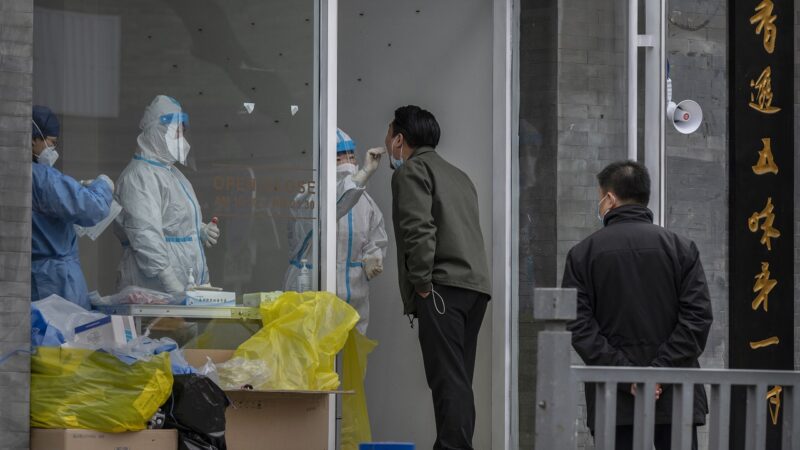
Before the 20th National Congress of the Communist Party of China, the highly infectious Omicron BF.7 variant has spread to 4 provinces and 6 places, and pedestrians and patients are infected when they meet on the road. "Transmission through the road" can easily lead to a large-scale outbreak of the epidemic.
News (5)
Shenzhen's case of "passing transmission"
According to official reports, as of 12 October 2022, the BF.7 mutant strain had spread to Hohhot and Ulanhot in Inner Mongolia; Shaoguan and Shenzhen in Guangdong; Yantai in Shandong and Shaanxi Province.
The Shenzhen Municipal Health Commission said on 11 October that the BF.7 variant was discovered for the first time in the city. The virus spreads rapidly, has strong infectivity, and has a shorter intergenerational interval, making it easy to cause large-scale spread.
A case of "crossing transmission" has been found in Shenzhen. A patient met a pedestrian on the side of the road, and the pedestrian was infected because neither of them wore masks.
The Shenzhen authorities require all people who come to (return) Shenzhen to implement "three inspections and three nos for three days", that is, nucleic acid inspections are carried out once a day for three days, no meals, no gatherings, or going to crowded places during this period, and visitors are not allowed.
Many residential areas in Shenzhen have been temporarily closed, the streets are sparsely populated, and many shops are closed, creating a depressing scene.
Mr. Minjing of Shenzhen told NTDTV, "I'm going crazy, what's not affected? It's all affected. Doing nucleic acid every day, oh my, I'm dead. If I don't do it, I can't go to work. If it goes on, the virus will not die, but people will die.”
News (6)
BF.7 strains appear in many places
On 11 October 2022, Zhang Yi, director of the Infectious Disease Prevention and Control Institute of the Shaanxi Provincial Center for Disease Control and Prevention, told the media that on 3 October 2022, Shaanxi Province reported a family cluster epidemic, which was infected with the BF.7 virus strain. They are people returning from family visits in Hohhot.
News (7)
Home quarantine in Shaanxi for 3 days with nucleic acid testing
Shaanxi Province requires people who return to Shaanxi to be quarantined at home for 3 days, and at the same time implement the measures of nucleic acid testing twice in three days (24 hours apart).
News (8)
10 cases of BF.7 infection in Yantai
Yantai, Shandong Province announced on 10 October 2022 that since 4 October 2022, a total of 10 cases of BF.7 infections have been reported in this round of local epidemic in Yantai, mainly those who returned to Yantai from outside the province and their associated personnel.
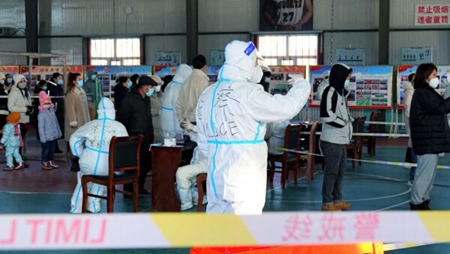
Image : On 4 December 2021, people in Hulunbuir, Inner Mongolia, line up for nucleic acid testing. (STR/AFP via Getty Images)
News (9)
Ulanhot reports mainly asymptomatic cases of BF.7 infection
On 9 October 2022, Ulanhot, Inner Mongolia reported that one confirmed case and seven asymptomatic infections were found, all of whom were infected with BF.7.
In the evening of 7 October 2022, Shaoguan, Guangdong Province reported that two mutant viruses, BF.7 and BA.5.1.7, were found to be spreading at the same time.
On 11 October 2022, Zhang Yi, director of the Infectious Disease Prevention and Control Institute of the Shaanxi Provincial Center for Disease Control and Prevention, explained this.
On 28 September 2022, a case of BF.7 infection was reported in Hohhot, Inner Mongolia, the first time the virus was detected in China.
News (10)
Inner Mongolia preventing the BF.7 epidemic from spilling over to the capital
In order to protect the 20th National Congress of the Communist Party of China, various regions are strengthening the closure and control, and do their best to prevent the epidemic from spilling over to Beijing. The secretary of Inner Mongolia publicly declared that epidemic prevention should "kill chickens with a bull's knife" to prevent the epidemic from spilling over to Beijing.
Symptoms of infection with the BF.7 variant include high fever, persistent cough, body aches, headache, sore throat, altered sense of smell, and loss of appetite. The World Health Organization recently issued a warning that BF.7 is spreading globally and "may become mainstream within a few weeks."
News (11)
Epidemic outbreak in 11 districts of Beijing, many places blocked
The 20th National Congress of the Communist Party of China is approaching, Beijing has implemented strict prevention and control measures, but the number of infected people continues to increase.
According to the Beijing Health Commission, on 11 October 2022, 10 new local confirmed cases and one asymptomatic infection were added. Because the CCP has been covering up the outbreak, the actual number of infections may be higher. Beijing has required people entering the capital to undergo two inspections over three days.
As of 12 October 2022, the epidemic in Beijing has involved 11 districts, with 15 transmission chains, including Chaoyang District, Dongcheng District, Changping District, Daxing District, Xicheng District, Fengtai District, Tongzhou District, Haidian District, Fangshan District, and Huairou District , Yanqing District. There is a risk of a major outbreak in Beijing.
Online video shows that some neighborhoods in Beijing are blocked by iron bars and shops are surrounded by iron sheets. Some areas in Fengtai District and Yidongli were blocked, and residents were prohibited from going out.
There are also netizens who broke the news that the whole village of Dongyao Village in Chaoyang District was taken away and isolated. Gate B of Building 12, District 1, Fangcheng Park, Fengtai District is blocked, and only one can't enter.
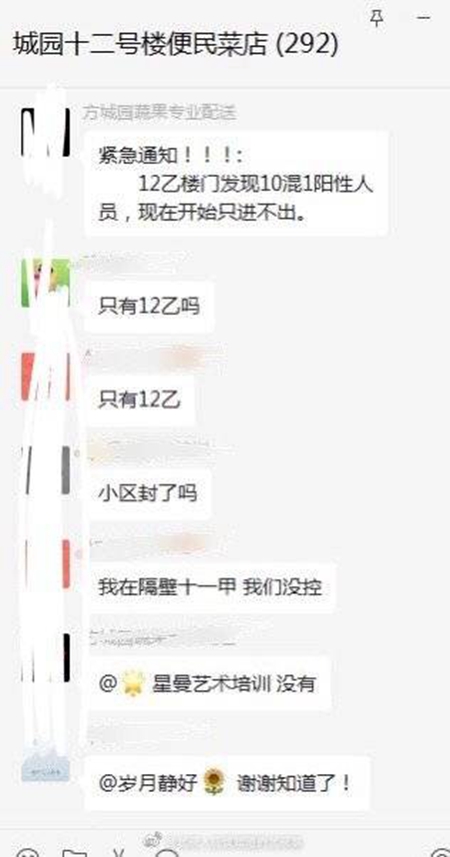
Image : Weibo picture
A "Ten Mixed One" positive co-manager was detected in Gonghua Xincun Community in Changping District, and the community was temporarily closed.
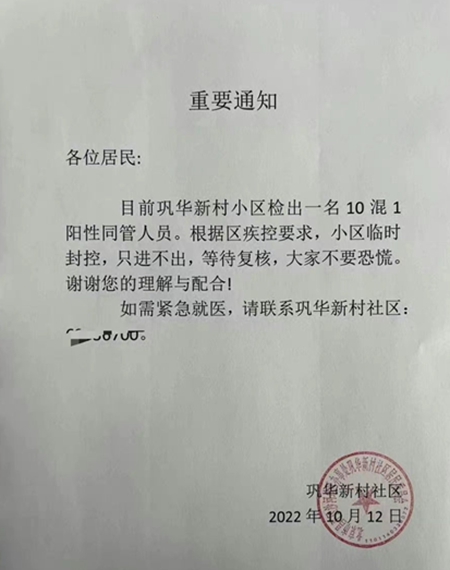
Image : Weibo picture
The entire yard of the Beijing Meteorological Bureau was sealed, and only one could not enter. Zhugangzi Village, Changyang, Fangshan District, was closed, and epidemic prevention personnel were disinfecting.
Netizens lamented, "I can go in but not come out, so I can't go to work this time." "It's really hard for the people in Beijing. It's just two days after the epidemic, and they're quarantined again."
Beijing is expanding the quarantine square cabin hospital, and Mr. Yu, a Beijing citizen, told NTDTV, "There is an isolation-like square cabin hospital built next to Dongyao Village. Passing by there, it was built like an Olympic Village, which is a place for centralized isolation and treatment."
News (12)
Thousands of people in Hohhot are quarantined abroad, people complain about lack of supplies
Reporters : Chen Jie, Li Shanshan and Boni / https://www.ntdtv.com/gb/2022/10/12/a103549444.html / Image : Video Screenshot
Hohhot, Inner Mongolia, officially announced that the number of infected people in this round of epidemic has exceeded 4,000, and there are more than 550 medium and high-risk areas. At least thousands of people have been taken to the field for isolation. People who were locked up at home complained about the shortage of supplies and could only place orders from designated grocery shopping groups, which were several times more expensive.
As of 11 October 2022, it was officially notified that there were 4,357 covi-positive infections in this round of epidemic in Hohhot, Inner Mongolia, and the actual number of infections remains to be verified. Officials said that the epidemic strain of this round of epidemics is the Omicron BF.7 variant, which spreads faster. At present, the city has 435 high-risk areas and 116 medium-risk areas.
Online video shows that on the 9th, many citizens in Hohhot wore protective clothing, pulled their luggage, boarded the bus to the station, and then took a special train and were sent to Bayannaoer. According to a document, hotels in Hohhot and surrounding cities that could be used for quarantine have been exhausted, and it was decided to send 1,000 people to Bayannaoer for quarantine.
Some citizens said that the local area is like under martial law.
Mr. Yue, a citizen of Bayannaoer, said, "The whole city is now under martial law. Today is the fourth day. Now the shops, canteens, and units are all closed."
Ms. Ji, a citizen of Hohhot, said, "The positive infected people have been diverted to other neighboring cities. I don't know if there are any deaths. We have many positive infected people now, breaking 4,000, and doing nucleic acid testing every day. The bus stopped five or seven days ago."
Residents of Hohhot revealed that there is currently a shortage of supplies, so they can only place orders from the grocery shopping group designated by the property, and the price is several times more expensive than usual.
Ms. Ji commented, "Seriously! All communities are closed. Now materials are in short supply, and food can't be served online. You have to go to the grocery shopping group designated by other people's properties to place an order. The price is definitely higher than usual. 2 times, 3 times. There are many vegetable shops in the courtyard of the community, and none of them are allowed to open. We have to order food from outside, and we can't order food. Others are so anxious to die. Every day I wait for this order to be delivered."
The video shows that in the afternoon of 11 October, Hohhot continued to isolate people, including the North District Dormitory Building of Inner Mongolia University of Technology, and the Ouxing Champagne Beautiful Community.
News (13)
Cleared and upgraded again, it is said that Zhengzhou High-tech Zone officially carry out "two inspections a day"
Editor : Zheng Gusheng / https://www.ntdtv.com/gb/2022/10/12/a103549649.html / Image : On 5 January 2022, a nucleic acid detection sampling point in Zhengzhou. (STR/CNS/AFP via Getty Images)
清零再升级 传郑州高新区正式“一天两检”
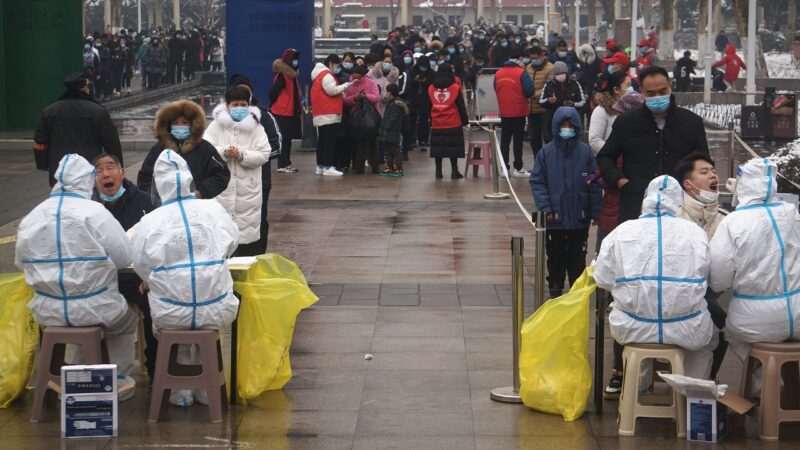
The CCP's "dynamic clearing" continues to escalate, overwhelming many people. A few days ago, it was reported on the Internet that Zhengzhou High-tech Zone issued a notice to implement "two inspections a day" for three consecutive days, that is, nucleic acid sampling twice a day. Many netizens expressed anger.
On 12 October, a notice from Zhengzhou High-tech Zone came out online, requiring the whole district to implement "two inspections a day" for 3 consecutive days from that day, with samples taken in the morning and evening.
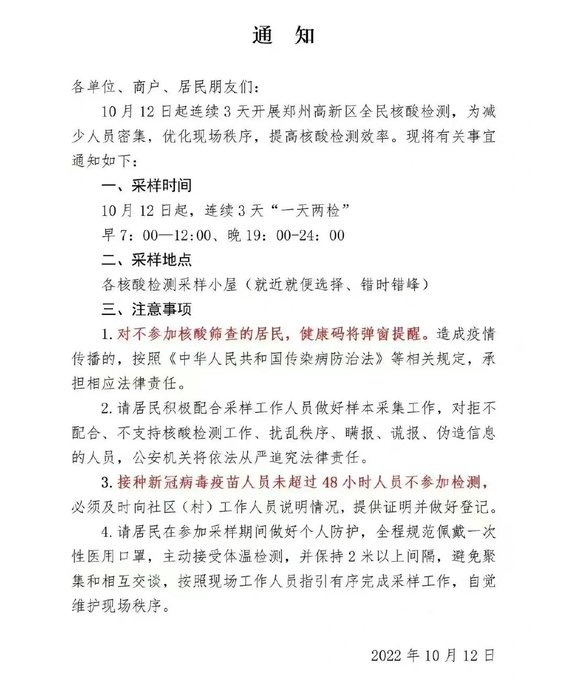
Image : Network Diagram
Subsequently, notices from various sub-district offices under the High-tech Zone were exposed. The notice more clearly requires that residents must participate in nucleic acid sampling twice a day for 3 consecutive days, once in the morning and once in the evening.
In addition, the street notice also requires residents to "do not go out unless it is necessary", and each household can go out for shopping at most one time per day, and at the same time, it is necessary to reduce the gathering of people and the flow of people and vehicles.
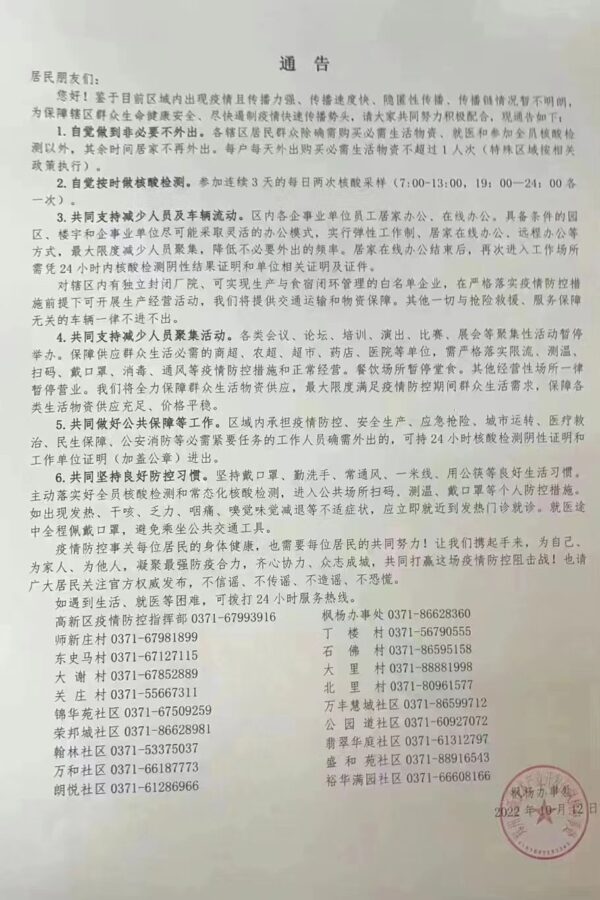
Image : Network Diagram
Prior to this, it was reported on the Internet that Xinjiang and other regions had already started "two inspections a day". The announcement of Zhengzhou High-tech Zone was the first official written material to implement "two inspections a day" to confirm the matter, so it quickly detonated online public opinion.
Frequent nucleic acid testing by governments across the CCP has already exhausted the public. Some netizens said that just when they were looking forward to the relaxation of "one inspection every two days", they unexpectedly ushered in "two inspections a day".
On Twitter, netizens have left messages to denounce: "You don't have to do anything else a day", "When will you check three times a day", "Will you check every hour after that?" Doing things against humanity" "If you don't toss yourself to death, you won't stop".
There are also many netizens who directly point to the powerful interests involved in the intensive nucleic acid testing: "Nucleic acid companies have won the money", "This is to speed up the speed of making money", "I just feel a little sad. On, on the medical insurance fund that the nationals worked hard to save quickly, the quilt (pulling out) has become negative."
Not only nucleic acid testing, but the CCP's various epidemic prevention measures are becoming more and more extreme. Some netizens summed up the process of escalating the centralized isolation policy.

Image : Web screenshot
The CCP's "dynamic clearing" has evolved into a political movement. There are different opinions about the reasons for Beijing's insistence on extreme "epidemic prevention". Some people think that the driving force of this matter is the CCP's "political line struggle" and the powerful interests behind related industries. Others believe that the CCP’s rule is in jeopardy, and the authorities may wish to strengthen social control by “dynamic clearing" to maintain the regime. Some people even speculate that the CCP may use "zero-covid" to return China to poverty, so that the totalitarian government can more easily control the people who have nothing by monopolizing all social resources.
News (14) to (17) / Reporter : Lin Jiaying / https://www.8world.com/singapore/covid-19-spike-in-local-cases-not-a-concern-for-now-1942841 / Image of Singaporeans on masks waiting to cross the traffic : Researcher's Picture
News (14)
The number of new covid cases in a single day has exceeded 10,000. Experts: No new transmission characteristics have emerged, no need to worry
It took more than two months for the number of new cases of local covid in a single day to break through 10,000 on 11 October 2022. Minister of Health Ong Ye Kung also said that the secondary infection rate in Singapore is 15%. The infectious disease experts interviewed pointed out that the local medical system is not under pressure, and unless a new mutant strain with different transmission characteristics emerges, the public does not need to worry about the current situation.
Singapore reported 11,732 new confirmed cases on 11 October 2022, with two deaths and a further increase of more than 30 hospitalized patients but the weekly case transmission rate edged down to 1.73.
News (15)
No evidence of worsening of the patient's condition
Health Minister Ong Ye Kung pointed out that cases of the BA.2.10 or XBB strain of SARS-CoV-2 have increased rapidly and now account for more than half of the daily new cases, spreading faster than BA.2.75 and BA.5. However, there is currently no evidence that patients infected with this strain are more seriously ill, and authorities are closely monitoring the spread of the strain.
Professor Zhang Yiying, Dean of the NUS So Shuifu School of Public Health, told 8 Vision News that although confirmed cases and hospitalizations have increased, the main concern should be whether the chances of vaccinated people becoming seriously ill or dying have changed. There is no evidence that this is the case.
He pointed out that the increase in hospitalizations was due to more people contracting the virus, not the new strain making people sicker. He also said that as long as any country adopts a long-term strategy to combat SARS-CoV-2, it will inevitably face a new wave of epidemics. This situation is no different from the situation in which Singapore experiences periodic influenza.
News (16)
Expert: Case ups and downs are the new normal
Dr Leong Hoa Nam, an infectious disease consultant at Elizabeth Novena Hospital, said the public did not need to worry about the surge in cases. The rise and fall of cases is the new normal. The only disadvantage is that it will bring inconvenience to people's lives, such as the need to take sick leave when diagnosed, affecting work and plans.
Speaking at an event at Yale-NUS College on 12 October, Ong Ye Kung said that 15% of people in Singapore are currently infected for the second time, which means that for every 100 patients, 15 people are infected for the second time. If 50% of people start to have a second infection, there will be a big wave of infection.
Dr. Leong Hoa Nam said that this is inevitable. It is expected that the local secondary infection rate will reach 50% by March 2023 but whether the government implements new measures still depends on the hospitalization and severe cases. If there are not many cases, Singapore will still maintain normal life.
Professor Zhang Yiying also said that Singapore does not need to take new measures at present, and he encouraged all eligible people to receive the second supplementary dose to reduce the severe rate.
"We need to focus on what's going on in hospitals and make sure medical facilities aren't under pressure. At the moment, there's no such issue."
According to the data from the Ministry of Health as of 12 October 2022, the daily utilization rate of ICU beds in Singapore is 66.67%, of which 3.6% are covid patients.
At present, Singapore no longer compels people to wear masks on most occasions, and experts point out that whether to wear masks in public places depends on the individual.
News (17)
Leong Hoa Nam: Those who don't want to take risks should wear masks
Dr. Leong Hoa Nam said that the public can decide whether to continue to wear masks. If they choose not to wear masks, they must be mentally prepared for the possibility of getting sick.
Professor Zhang Yiying advised those who do not want to take risks to continue to wear masks. "Wearing masks in public places provides some degree of protection not only against Covid-19 but other forms of respiratory infections, but I don't think we should make it mandatory for people to wear masks because of the new wave."
News (18)
143 countries agree! UN General Assembly condemns Russia's illegal annexation of Ukrainian territory, China abstains
Image : The UN General Assembly overwhelmingly adopted a resolution condemning Russia on the 12th. (AFP)
The UN General Assembly overwhelmingly passes a resolution condemning Russia on 12 October 2022, condemning Russia's illegal annexation of Ukrainian territory. Ukrainian President Volodymyr Zelenskyy thanks the countries that has voted in favour and says the resolution is of historic significance.
According to comprehensive foreign media reports, in this emergency meeting on the Ukraine issue, 143 of the 193 member states of the United Nations General Assembly voted in favor of condemning Russia’s illegal actions, while 5 oppose it, 35 abstain, and the rest did not cast votes. The meeting overwhelmingly passed a resolution condemning Russia for holding "referendum" in Ukraine and illegally annexing parts of Ukraine's territory. Those who voted against it include Russia, Syria, Nicaragua, North Korea and Belarus. 35 countries, including China, India, South Africa, Pakistan, Thailand, Kazakhstan, Mongolia and Vietnam, abstain from voting.
The U.S. ambassador to the United Nations, Linda Thomas-Greenfield, said the vote is important not only for the future of Ukraine and Europe, but also for the foundations of the United Nations. Thomas-Greenfield stresses, "The United Nations is built on the idea that a nation will never be allowed to seize another nation's territory by force."
Thomas-Greenfield points out, "Our message today is very clear, as a country, no matter how big or small, rich or poor, long or short, as long as you are a member of the United Nations, territorial borders are protected by international law, they cannot be attacked by force from anyone.”
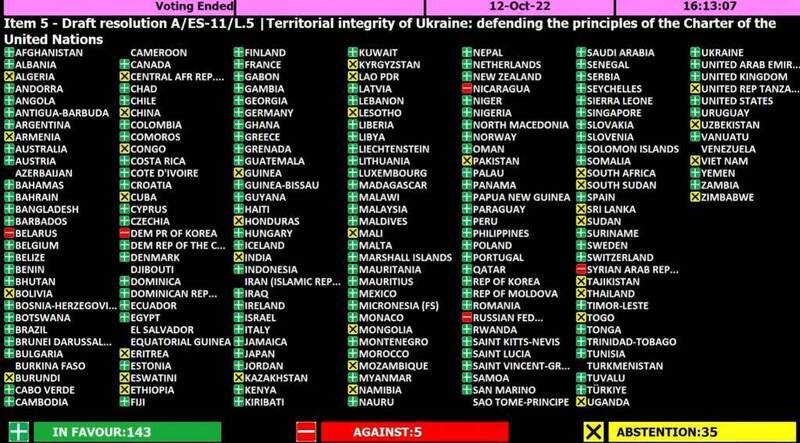
Image : 143 countries voted in favor, 5 countries opposed and 35 abstained. (The picture is taken from the Twitter of Ukrainian President Zelenskyy)
News (19)
White House releases national security strategy mentioning Taiwan, saying China is a major challenge and the U.S. must win the arms race
Image : White House National Security Adviser Jake Sullivan. (Reuters)
The White House of the United States launched a national security strategy document on 12 October 2022. This document has 48 pages, and mentions that China is a major challenge to the U.S. If the United States wants to maintain its global influence, it must win an economic arms race with China.
"Voice of America" reported that White House National Security Adviser Jake Sullivan (Jake Sullivan) briefed the document, he pointed out that now has entered a key decade of two basic strategic challenges, one is the development of major powers to shape the future international order. The second is to contend with a series of transnational challenges, including climate change, food security, terrorism and inflation.
Sullivan said, therefore, the United States must invest in power and influence to compete with great powers and address the world's common challenges, in addition to building strong international alliances, enhancing collective influence, and finally setting norms in key areas such as network technology, trade, economic investment and so on.
In this crucial decade of competition, especially with China, it is crucial to define the conditions of competition and address the enormous challenges.
Taiwan is also mentioned in the document, pointing out that maintaining peace and stability in the Taiwan Strait is in the consistent interests of the United States and is very important to regional and global security and prosperity. According to teh Taiwan Relations Act, abide by the three communiqués of the United States and China and the six guarantees to Taiwan.
The document also states that the United States will abide by its commitments under the Taiwan Relations Act, support Taiwan's self-defense and maintain the ability of the United States to resist any military pressure on Taiwan.
News (20)
The border is reopened! Chen Shizhong recalls the past and is inevitably sad, hoping for a quick economic revitalization
Reporter : He Yuhua / https://election.ltn.com.tw/2022/news/breakingnews/4087659 / Image : Chen Shizhong, a candidate for the Taipei mayoral election of the Democratic Progressive Party, held the "Azhong Station Intersection, Support 18-year-old Citizenship, Support the Youth in Taipei" event at Zhonghua Road and Aiguo West Road on the 13th. Chen Shizhong waved to the people on the road for support. (Photo by reporter Luo Peide)
The gate of the Republic of China reopened on 13 October 2022. Chen Shizhong, a former DPP mayoral candidate for Taipei, who served as Minister of Health and Welfare and commander of the Central Epidemic Command Center, could not hide his excitement. Talking about internal affairs shows a happy mood. In an interview today, he said that the door can be opened, everyone does not need to be isolated, and the mood is relatively relaxed and happy. The most important thing is to hope that the economy will be revitalized as soon as possible.
Chen Shizhong went to Aiguo West Road and Zhonghua Road early this morning to worship votes to promote the "18-year-old Citizenship" referendum vote at the end of the year. When asked about his thoughts on the reopening of the country today, he said that the epidemic has lasted for more than two years, and everyone is very bored. The door can be opened and quarantine is not required. Everyone will feel relatively relaxed and happy. He also hopes that the epidemic will dissipate as soon as possible and everyone will return to normal life.
He mentioned that he had a lot of feelings for the first live broadcaston 12 October 2022t, and he interacted with everyone very well, but because he had not started the live broadcast for a long time, he was still a little nervous.
For the non-party Taipei mayoral candidate Huang Shanshan, who was broadcast live at the same time last night, Wan Hua choked up and wept when he talked about the epidemic; Chen Shizhong said that during the epidemic prevention, there are many sadness, hard work, difficulties and choices, and every participant only needs to think about it. Various situations at that time made him feel a lot of psychological pressure. Huang Shanshan was also a front-line commander, and she would encounter many things that required a choice. Thinking of the general manager during the epidemic, it was inevitable that she would feel a little sad.
However, Chen Shizhong said that as a commander in the central government, he encountered more things to choose from. In order to avoid harm, he often had to make some decisions that would limit and damage the citizens. He felt bad about it, but in order to control the epidemic, he had to do it. Fortunately, everyone is willing to cooperate in the national epidemic prevention. He said that as long as the people who were on the front line and dealt with things at that time, thinking of all kinds of things during the epidemic, they would still be a little sad but there are still some matters to be happy about. Fortunately, the epidemic is about to pass slowly, and he hopes the economy will revive as soon as possible.
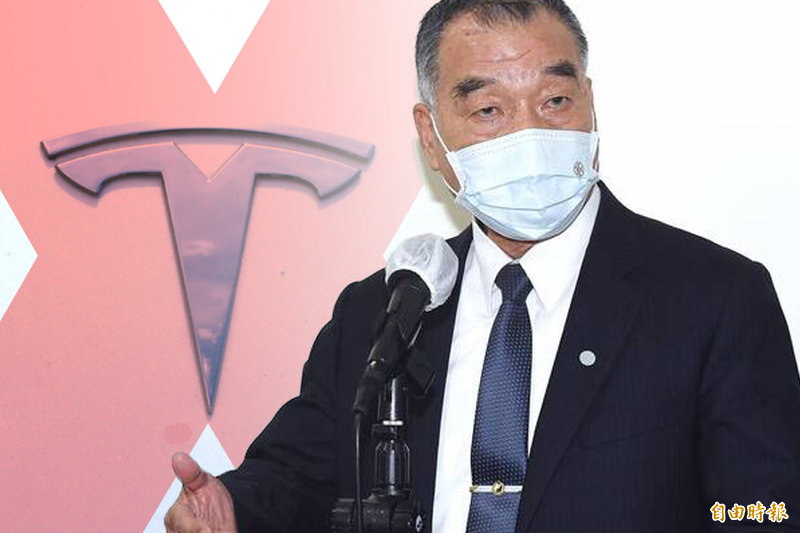
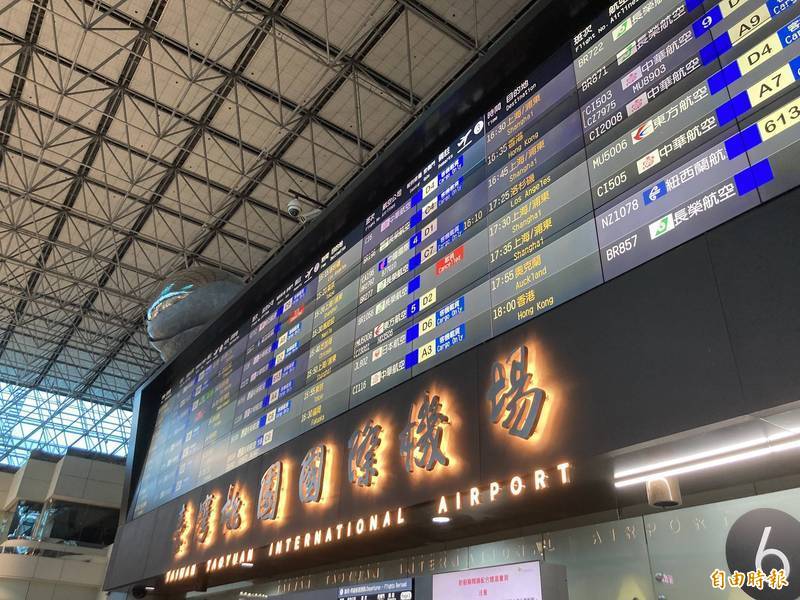


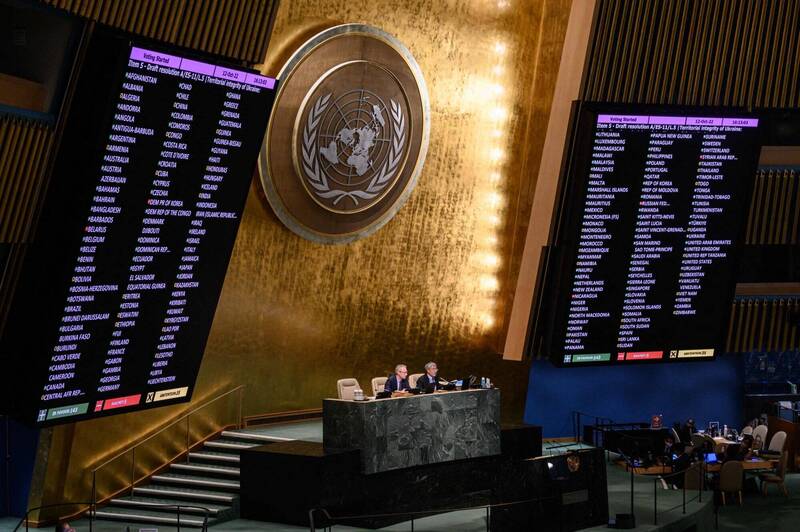
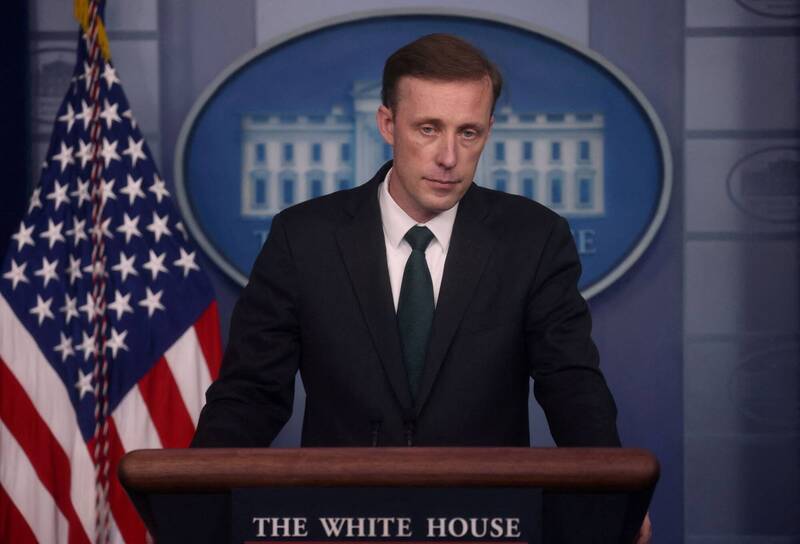
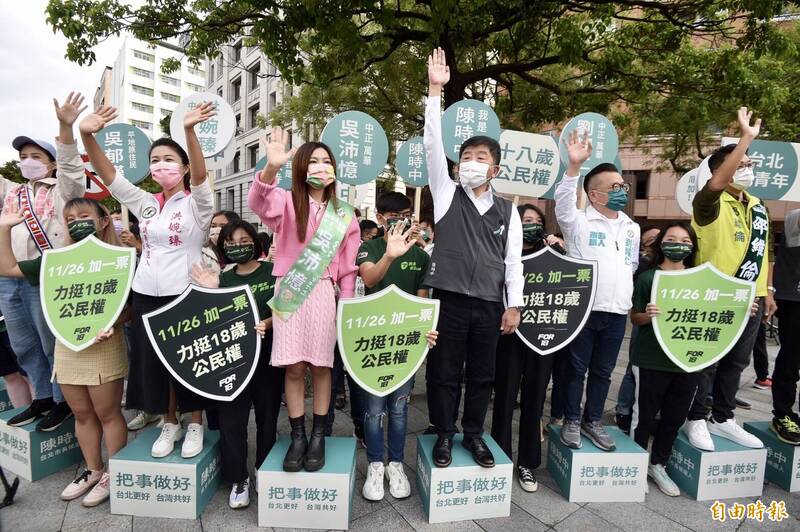



No comments:
Post a Comment